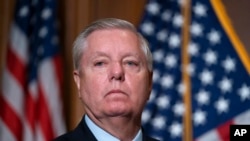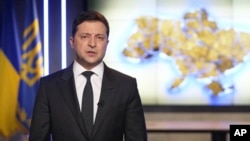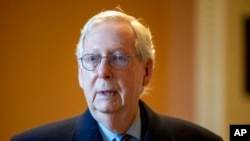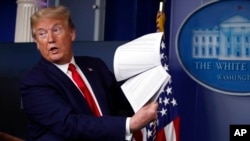In the days since it became clear that Russian President Vladimir Putin was about to order a full-scale invasion of Ukraine, many Republican politicians in the United States have taken the opportunity to suggest that if Donald Trump were still president, Putin would not have taken such a cataclysmic step.
It’s an argument that some experts on Russia policy agree with - just not for the reasons being put forward by critics of President Joe Biden, a Democrat.
The dominant narrative among many in the GOP was articulated Wednesday by South Carolina Sen. Lindsey Graham, who said on Fox News, “If Donald Trump were president, none of this crap would be going on, because you’ve got to be strong. When you’re weak is when everything falls apart. And Biden is weak, and Trump was strong.”
But Michael O’Hanlon, director of research at the Brookings Institution and the author of the book, “Beyond NATO: A New Security Architecture for Eastern Europe,” disagreed with the idea that Putin was somehow cowed by Trump.
“The only reason that Putin might not have wanted to do this, were Trump in office, wouldn't have been out of fear of Trump,” O’Hanlon told VOA. “It would have been affection for Trump, and not wanting to do this on the watch of his fellow strongman.”
While noting that Putin bears “100% of the moral responsibility” for the conflict in Ukraine, O’Hanlon said that the roots of Putin’s security concerns about Russia’s neighbor and NATO’s eastward expansion run very deep. They extend through the administrations of multiple U.S. presidents, during which time the alliance grew significantly and absorbed multiple states of the former Soviet Union.
Trying to reduce Putin’s reasons for action to a change in U.S. administrations, he suggested, was at best an oversimplification.
American is back
“American policymakers have had lots of indication, for a very long time, that Ukraine was a red line for Moscow,” said Joshua Shifrinson, a fellow with the Woodrow Wilson Center and an associate professor of International Relations at Boston University.
A number of events that exacerbated Russia’s concern about the country took place while Trump, not Biden, was president.
In 2019, Ukraine amended its constitution to commit the country to ultimately becoming a member of NATO. When current president Volodymyr Zelenskyy took office that year, he laid out a plan meant to expedite the country’s efforts to join the alliance.
Shifrinson said that it is just as possible to argue that Putin felt driven to act – not by weakness on Biden’s part – but rather by his strong embrace of America’s NATO allies, a group that Trump tended to keep at arm’s length, and by signals early in his presidency that he was receptive to Ukraine’s desire to join the alliance.
“By proclaiming that ‘America is back’ and signaling that maybe NATO membership was on the table, or could be on the table one day, it may have given Putin a sense that this has to be addressed sooner than later,” Shifrinson said. However, he added, “I want to be very clear that this is not to say that Biden caused Russian activities. This invasion is entirely Russia’s choice, and immoral and illegal.”
Afghanistan as driver
Another narrative coming from many Republicans draws a straight line from the United States’ withdrawal of troops in Afghanistan last year to Putin’s decision to invade Ukraine this week.
In a news conference in his home state of Kentucky Thursday, Senate Minority Leader Mitch McConnell said, “I think the precipitous withdrawal from Afghanistan in August was a signal to Putin – and maybe to Chinese President Xi as well – that America was in retreat, that America could not be depended upon, and was an invitation to the autocrats in the world that maybe this was a good time to make a move.”
“I definitely don't think it has anything to do with Afghanistan,” said Jeffrey Edmonds, a research scientist with CNA, a national security think tank in Northern Virginia. “The vast majority of the drivers, to my mind, happened over the course of the last two years.”
This included a lack of progress on talks related to Russia’s ongoing occupation of the Ukrainian region of Crimea, its support of breakaway enclaves in eastern Ukraine, and U.S. and NATO security assistance to Ukraine.
“Things of that nature suddenly culminated to the point where [Putin] also decided to throw in all the other grievances he's had for decades, and to go big on this thing at some point during the last year,” Edmonds told VOA.
Trump joins discussion
Expert assessments aside, Trump himself has not missed the opportunity to agree that the invasion of Ukraine would not have taken place if he were president and to tie it to his false claim that the 2020 presidential election was stolen from him.
On Wednesday night, after praising Putin’s decision to enter Ukraine as “genius” during remarks at his Florida mansion, Mar-a-Lago, Trump appeared on Fox News with the Russian assault underway.
Trump was asked by host Laura Ingraham if he believed that a perception of “weakness” in Washington was the cause of the attack.
"I think you are exactly right,” Trump responded. Speaking of Putin, he said. “He was going to be satisfied with peace, and now he sees the weakness and the incompetence and the stupidity of this administration, and as an American, I'm angry about it, and I'm saddened by it. And it all happened because of a rigged election. This would have never happened.”
A previous version of this story incorrectly identified Max Abrahms as a lecturer. He is a tenured professor.





